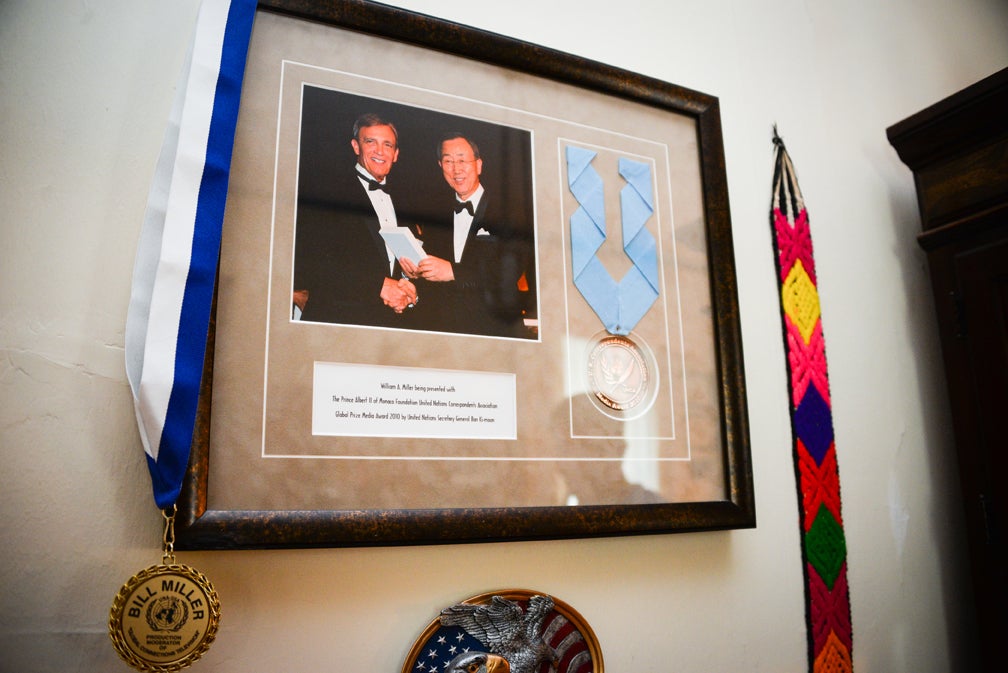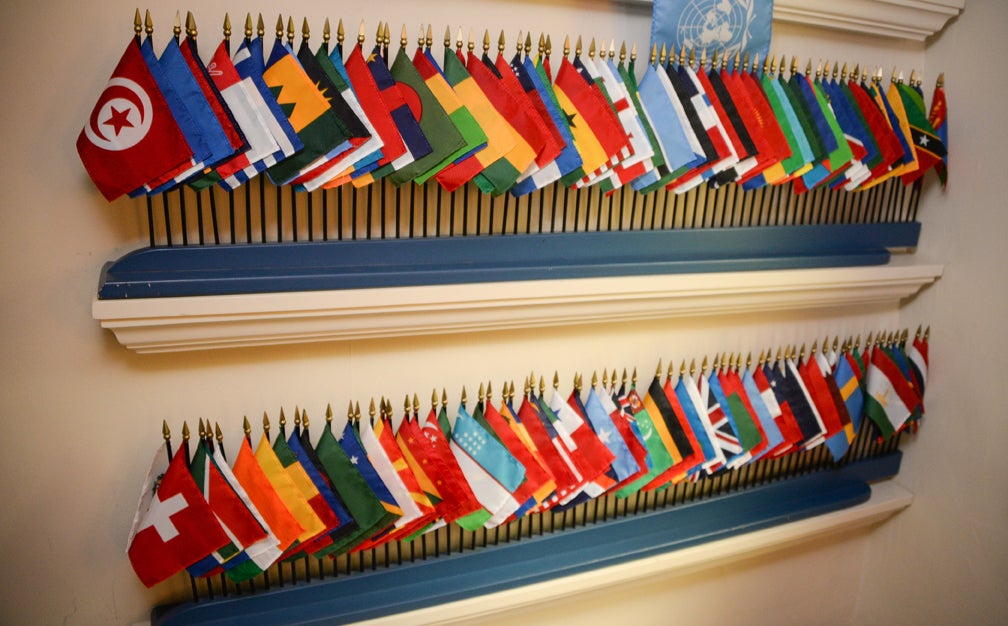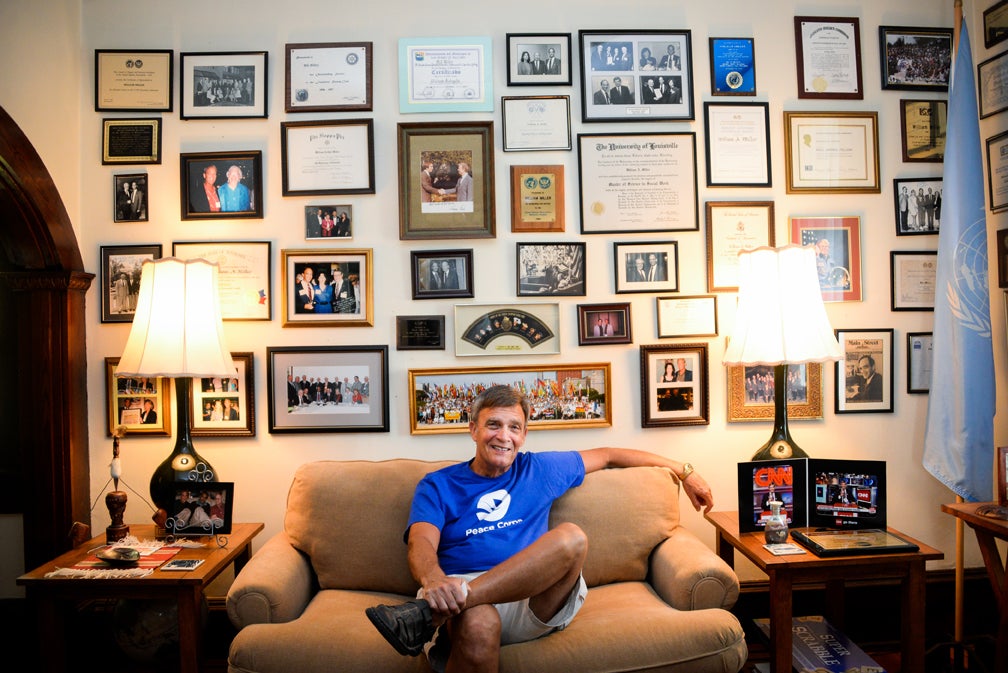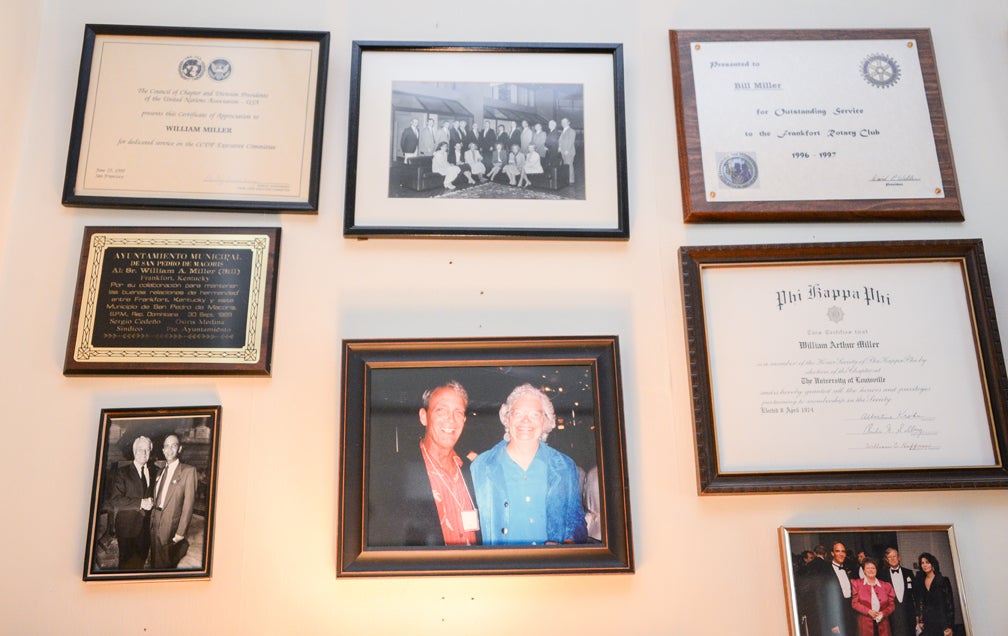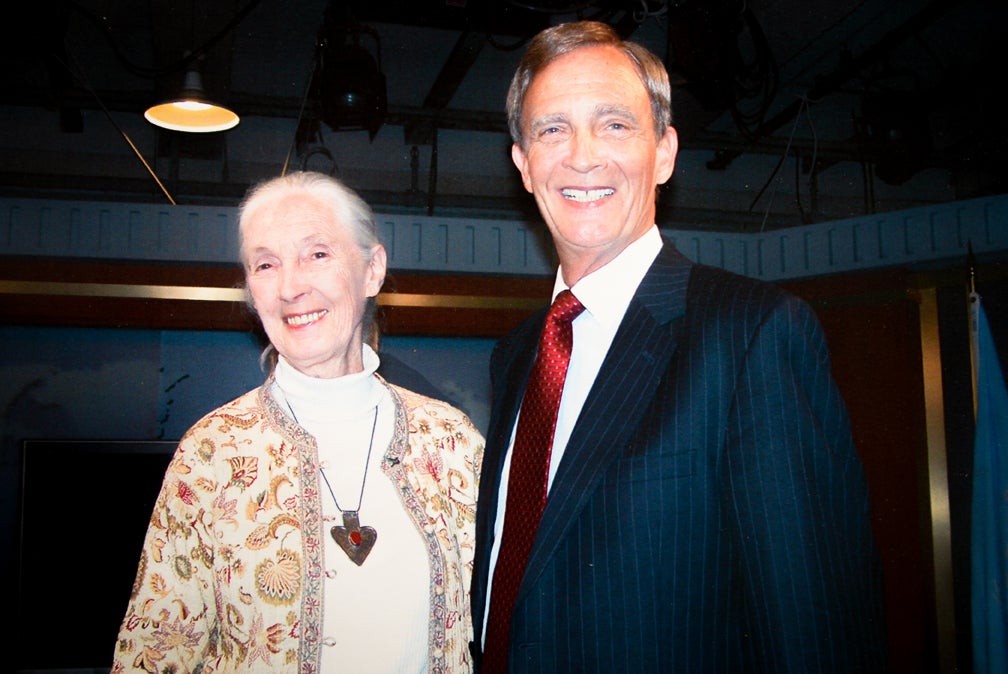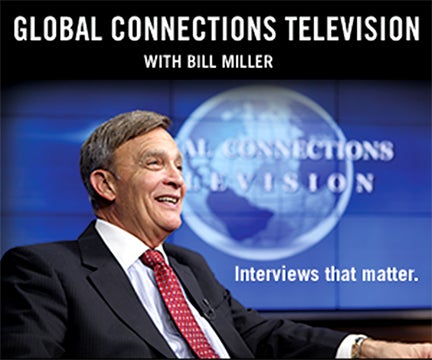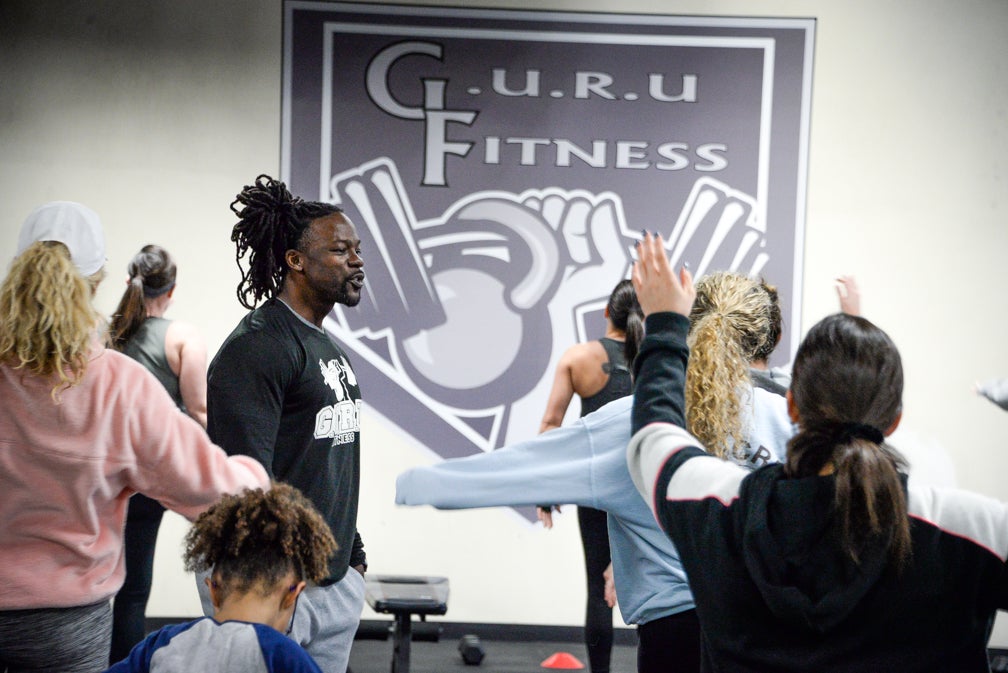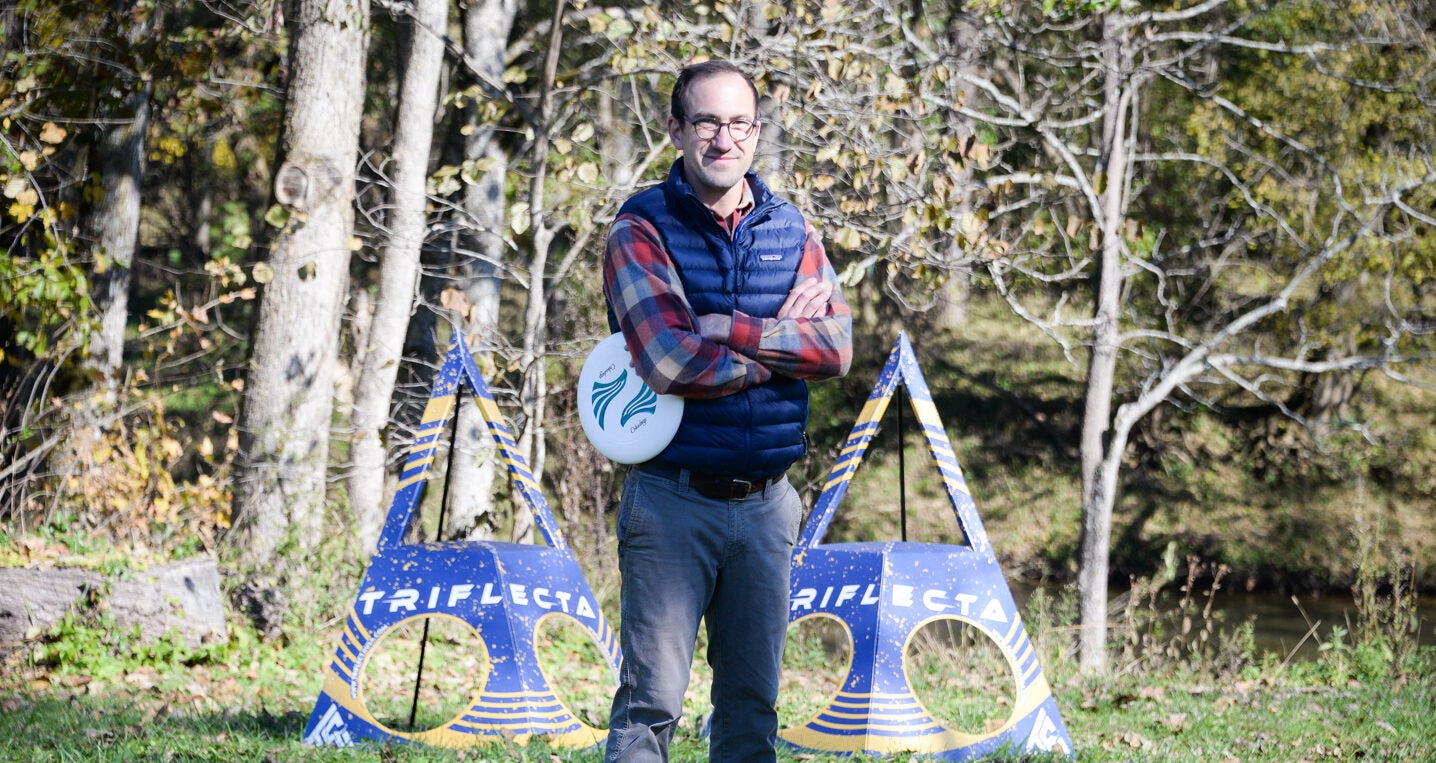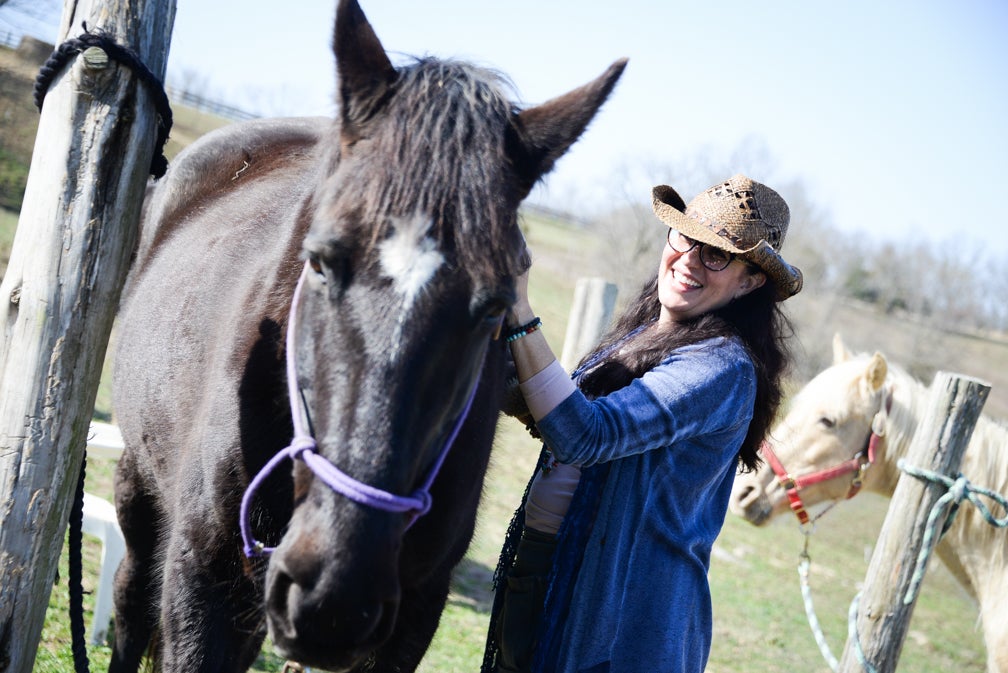After 11 years of commuting, Bill Miller still enjoys going to work in New York City once a month for four days.
When asked if he would like to live there, he quickly responds, “Not a chance. I like it right here in South Frankfort,” on a relatively quiet dead-end street in a large house with a screened-in front porch by the Kentucky River floodwall.
“I love to visit New York. It’s exciting. You meet some of the most fascinating people. But I prefer being in traffic jams that last two minutes.
“I can go to Louisville, Lexington or Northern Kentucky and get on a plane and go any place in the world. It takes me 25 minutes to an hour and 15 minutes to get to an airport from here. That’s quicker than my friends in New York can get to LaGuardia.”
Bill, who turns 74 years old Aug. 14, created Global Connections Television concept in 1994, first doing interviews at the Frankfort Plant Board’s Channel 10 studio. Since 2006, most of Bill’s 26-minute TV shows have been taped at the United Nations studio in Manhattan.
“Global Connections TV is the only program of its type in the world,” Miller says. “It’s provided at no cost as a public service to help people better understand international issues and how they impact us, whether we live in Frankfort, Kentucky, or Frankfurt, Germany, or in Lima, Ohio, or Lima, Peru.
“It’s estimated the talk show reaches more than 60 million potential viewers each week worldwide.”
The show is independently produced and privately financed.
He says if he had sat down and created a business plan for his international show he probably wouldn’t have succeeded. “But I sort of mumbled and stumbled into it. It’s been challenging and a lot of fun. I’ve met some of the most interesting people in the world.”
Topics include climate change, environmental sustainability, economic development, renewable energy, technology, global partnerships, education, food security, poverty reduction and health, peace and security, and gender issues.
Shows are broadcast worldwide through cable, satellite, public access TV and the World Wide Web.
Bill’s interviews are with upper-level United Nations leaders, international relations specialists, educators, private-sector business leaders, heads of nongovernmental organizations “and many other groups working to create a better world.”
Bill is an accredited journalist at the UN for the Washington International, now an online newspaper, and has written extensively on UN issues.
One of his early TV interviews in New York was with Dr. Jane Goodall, animal behavior expert and conservationist and a UN Messenger of Peace.
“She’s a very unique individual,” Miller says. “She has a presence and an aura about her that radiates genuineness. She’s committed to preserving planet Earth and the millions of species we have.”
He’s had two interviews with Peter Yarrow, an American singer and songwriter who found fame with the 1960s folk music trio Peter, Paul and Mary. Yarrow co-wrote with Leonard Lipton one of the legendary group’s greatest hits, “Puff, the Magic Dragon.”
Yarrow is a political activist who opposed the Vietnam War and in 2000 helped start Operation Respect, a nonprofit organization promoting tolerance and civility in schools. The project began after Yarrow and his daughter Bethany and son Christopher heard the song “Don’t Laugh At Me.”
“Peter, Paul and Mary were right in the middle of the civil rights movement,” Miller said.
They marched with the Rev. Martin Luther King Jr. in Washington, D.C., and Selma, Alabama. Like Miller, Mary Travers was born in Louisville. But she moved with her parents, both journalists, to Greenwich Village in New York City in 1938, at age 2. She died in 2009 at age 72.
“Yarrow has gone to the Middle East, the Gaza Strip, Israel and other places trying to stop school bullying,” Miller said.
GCTV wins award for environmental coverage
In 2010, Global Connections Television won the bronze Prince Albert II of Monaco Foundation-UN Correspondents Association Global Prize for outstanding environmental coverage. The award was presented to Miller by then UN Secretary-General Ban Ki-moon.
After receiving the award, Miller said, “The main goal of Global Connections TV is to help our audiences understand how international issues impact their lives. Climate change is probably the most important international issue since all 7 billion people on the Earth may be adversely affected by it.”
Explaining recently how his TV show moved to New York, Miller said that one year at a Rotary International Day at the United Nations, a light came on in his mind.
“It’s an event where Rotary leaders from around the world come to the UN headquarters for a day because Rotary and the UN are involved in a lot of the same public health projects such as Polio Plus. It dawned on me that Frankfort, Kentucky, is not the epicenter of the world, but the United Nations is. Every major world issue is being discussed at the UN every day.”
He went to the UN TV director at the time, Margaret Riddle, and told her about his Global Connections TV program in Frankfort. He said he visits New York periodically and asked her if he could possibly conduct his interviews in the UN studio.
“The UN has one really good TV studio with an excellent, professional crew,” Miller says. “They need more studios, but they don’t have the money. The TV director said, ‘You’re a journalist and a member of the UN Correspondents Association. If the studio is available, we will let you use it free of charge.’ ”
Miller was elated.
Each trip to New York costs him about $1,400, including airfare, hotels, food and taxis, he says.
“I stay in budget hotels and book with Delta 11 months out. Once I got the OK to use the UN studio, I immediately started booking to go to New York once a month for four days. I contact potential guests, invite them to be on the show and tell them where we’re going to meet.”
It’s not a “got-cha” talk show
“I work up scripts . . . questions. I don’t want anybody to come in cold. I want everybody to know a little bit about what we’re going to talk about. I’m not doing got-cha talk shows. I’m trying to inform the public about important issues.”
Then he calls the UN-TV staff and sends them a list of his guests and the days he would like to use the studio.
“They usually give me a time slot of 3 and 4 p.m. One of the challenges I run into is, if anybody from the UN needs the studio, I get bumped, and I understand that.”
He says his shows are on the air 52 times a week in Manhattan.
“I got a call several months ago from PBS Community Access TV people in Albany, New York, wanting to run my show. Someone from Ventura College in California called wanting the show. They have 75,000 students from Oakland to San Diego in their community college system. University of Maryland did the same thing. I give the show away. Anybody can go to my website, www.globalconnectionstelevision.com/video-gallery and download it.
“I have a lot of themes: economic development, unemployment, human trafficking, migration, you name it. Every issue is on the table. But two things I really try to focus on are climate change and the empowerment of women. They are the critical things, in my opinion, that don’t get enough coverage.”
About 25 percent of his guests are UN people.
“They have a great reservoir of talent, people with incredible knowledge about key issues.”
When Miller is asked what his target population is for his TV show, he says “7.5 billion — everybody on the planet. I don’t care about 18-34 age categories and all that stuff.”
Miller believes Global Connections TV has become much more popular in the last year because of a series of full-page ads he started running in national magazines.
“I went for 10 years and never bought a single ad, and then last year Katrina vanden Heuvel, editor and publisher of The Nation, encouraged me to take out an ad in her magazine. She said a full-page is $13,000, and I said, ‘Forget that.’ Then she said, ‘We will give you a deal: $2,500 if you run the ad three times.’ That was quite a comedown, so I took it.”
Miller says he’s “known Katrina for years and did an interview with her for my show.” He also knows her father, Bill vanden Heuvel, an assistant to U.S. Attorney General Robert F. Kennedy in 1962 who was involved in Kennedy’s political campaigns in 1964 and 1968. Bill Heuvel and Miller served together on the United Nations Association-USA board of directors.
The Nation, with a circulation of 103,478, is the oldest continuously published weekly magazine in the U.S., founded in 1865.
After Miller’s ad ran in The Nation, ad representatives from Harper’s, Mother Jones and New Republic magazines called and offered to match The Nation’s deal, he said.
He accepted, “and I’ve hit a crunch point. My budget is out the window. If I take anymore ads, I have to get external funding. I’m going to some foundations to see if I can get help.”
The last six years Miller has done freelancing for South-South News while in New York, helping fund most of his TV show. But unfortunately, that funding has ended because SSN may be sold, he said.
Retired state government employee
Miller is a retired employee of the Kentucky Legislative Research Commission. He worked there from 1977 to 1999, primarily as a federal and international relations specialist.
Upon retirement, he established Miller and Associates Federal and International Relations Consultants.
“It’s primarily a one-man operation . . . me,” he says, laughing.
From 1988 to 1991, he served as chairman of the United Nations Association-USA’s Council of Chapter and Division Presidents. He was president of the Kentucky Division of UNA-USA from 1986 to 1988, and is the current president of the Frankfort Chapter of UNA-USA. He’s been president of the local chapter off and on since 1979.
He’s been a member of the Rotary Club of Frankfort since 1980 and served as its president in 2000 and 2001. He was a Rotary International district governor in 2003 and 2004. In 1997, Miller was the recipient of the Rotary President’s Award for International Excellence.
He’s also active in the Frankfort Capital City Toastmasters Club and received a Distinguished Toastmasters award from Toastmasters International in 2015.
A native of Louisville
Miller grew up in a “blue-collar family” in Louisville with a younger brother and sister, Jim and Carolyn.
“Dad was a carpenter and mom was a homemaker. We had to rely on dad’s income from March through October, the good-weather months, for the entire year. We were tight on funds quite often. We never starved, but we really scrimped from time to time.”
Bill went to DeSales High School, a private Catholic school for boys.
“I had to help pay for tuition,” he says. “Our parents were firm believers in the rule that if you’re going to live in this house, you’re going to carry your fair share of the load.”
At age 11, one of Miller’s first no-payment jobs was scraping and painting the two-story family house. After that he managed to make a little money mowing grass.
A few summers, Miller worked 10-hour days on a large farm on Cane Run Road, making 33 cents an hour. In high school and college he and his brother made a little more money, painting houses together.
Miller went to the University of Louisville on a partial scholarship and got a part-time job at United Parcel Service on Oak Street.
“They hired college kids to sort packages and you had to be a member of the Teamsters Union.”
Three months later he started driving a UPS truck, delivering packages. He also found a job unloading and loading tractor-trailers for several trucking companies.
“Then I learned how to drive a tractor trailer,” he recalls, laughing. “It wasn’t that bad as long as you were going straight forward.”
His most miserable experience was trying to back a 40-foot refrigerated trailer at Fischer Packing Co. in Louisville.
“I took 40,000 pounds of beef up to Fischer. It was a narrow street and a fire hydrant was on one side, and it took me an hour-and-a-half to back the trailer down into a very narrow hole.” Several trucks were backed up waiting, and he finally asked one driver if he wanted to back it in for him.
“He said, ‘You’ll never learn if I do it for you.’ It was 95 degrees with no air-conditioning in the cab and I was smoking my unfiltered Camels.”
He started smoking in high school and quit 14 years later in graduate school.
“The dumbest thing I ever did was start smoking, and the smartest thing I ever did was giving it up. I was smoking two or three packs a day at one time. I used to go to the U of L Dental School to get my teeth cleaned because I didn’t have the money to go to a dentist. They hated to see me coming with all those nicotine stains.
“It’s tragic to see young people today smoking with all the information we have about how bad it is for your health. When I was smoking, we knew it wasn’t good for us, but today it’s much worse.”
Miller earned a bachelor’s degree from U of L in 1967, majoring in sociology and minoring in psychology. He has master’s degrees in social work and public administration from U of L and Kentucky State University, respectively.
He served in U.S. Peace Corps
By studying Latin at St. Matthias Elementary School and Spanish at DeSales High School and U of L, he acquired “an affinity for learning more about what was going on in Latin America.” Then after completing his bachelor’s, he joined the U.S. Peace Corps in 1968 and served two years in the Dominican Republic.
“That’s when I really developed a passion for international issues and the UN,” he says. “The first year I was a rural community developer, living in a remote area without electricity, a public water system and all the comforts of home. Our projects were building roads and schools.”
In his second year, he moved to Santiago de los Cavalleros, the second largest city in the Dominican Republic, and taught social work at Madre y Maestra University.
In 1965, there was a revolution in the Dominican Republic and President Lyndon Johnson sent Marines into the country, “and there was a lot of violence and turmoil,” Bill said. “Political turmoil continued while I was there and even for a few years after I left, so that was a very unique opportunity to serve there.”
When his two-year contract with the Peace Corps ended, he did a “one-year self-guided tour hitchhiking through South and Central Americas.
“It was a good opportunity to learn more about a lot of civilizations. I went to Brazil to look at the African influence there, and then went to Argentina and saw the European influence there. Then in Chile, Bolivia and Ecuador, you have the indigenous people; and the Mayans in Central America. I found that area of the world fascinating.”
Miller says he’s returned to the Dominican Republic close to 20 times since his Peace Corps days, and he plans to visit again in January.
“I try to go back and do one humanitarian project a year. I think it’s the prettiest country in the Caribbean and the people are delightful. They’re gregarious and enjoy interacting with you.”
He’s traveled to about 95 countries. He’s fluent in Spanish, semi-fluent in French and has studied German, Portuguese, Russian and Japanese. Bill and wife, Paula, a retired language arts teacher at Bondurant Middle School, visited Paris this summer and took a roundtrip cruise from Paris to Normandy on the Seine River.
“I haven’t gotten tired of traveling, but it’s getting more challenging,” Miller says. “I love being there in other countries, but getting there isn’t as enjoyable as it once was.”
A workaholic
Paula describes her husband as a “kind man who loves fairness in all things for everybody.”
He says his parents created a workaholic. “I’m constantly in motion doing something.”
He tries to go to the downtown YMCA six times a week when he’s in Frankfort.
“I’ve given myself the moniker of being the laziest exerciser there,” Miller says, laughing. “I watch CNN or MSNBC and read newspapers and magazines while riding a stationary bicycle.”
He subscribes to these newspapers, magazines and journals: The New York Times, USA Today, Lexington Herald-Leader, The Courier-Journal, The State Journal, Miami Herald, The Wall Street Journal, The Christian Science Monitor, The Nation, Harper’s, The Economist, New Yorker, The Progressive, The Guardian, The Hightower Report, Foreign Policy, Foreign Affairs and World Policy Journal.
Paula says he has so many newspapers and magazines to read he no longer has time to read books for pleasure, and plenty of unread ones are collecting dust in the upstairs bookcases at home.
But Paula realizes Miller’s work — to stay on top of critical world issues and to inform others — is a passion and gives him immense pleasure. At the same time it can be frustrating and exhausting trying to save all living beings on the planet.
“I subscribe to the philosophy we have an obligation to leave planet Earth in a better condition than we found it,” he says.
At 74, Miller wants to feel positive about the planet’s future.
“Normally I’m an optimistic person,” he says. “But with climate change, it’s difficult. There’s minimal optimism since 194 nations of the world came together to approve the United Nations Climate Change Agreement adopted in Paris in 2015.
“The negative side is that the U.S., the second-largest carbon polluter, has withdrawn from the agreement. Fortunately, the rest of the countries of the world are moving forward without the U.S.”
Glaciers are melting. Seas are rising. Desertification is taking place. Coral reefs are bleaching. Oceans are dying.
A UN report says by 2050, “there will be more plastic junk floating in the oceans, weight-wise, than fish,” Miller says. “That’s frightening. We’re adding more and more people. I feel we should be working toward a zero population growth that would maintain the current 7.5 billion population.
“One undeniable fact, according to scientists, is that if we continue on our current trajectory, the planet will be virtually uninhabitable by 2100 . . . I won’t be here then,” he said.
But infants today could be here if humanity wakes up and pays attention to climate change warnings.
That’s the highest hope for Miller — who has done his best for many decades to educate his state, nation and world about the interconnections of everything.
As long as he can, workaholic Miller will continue to get out the message that climate change has no borders.

